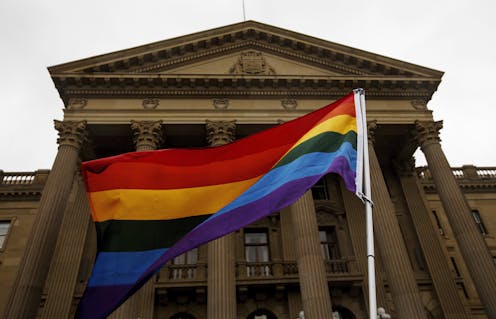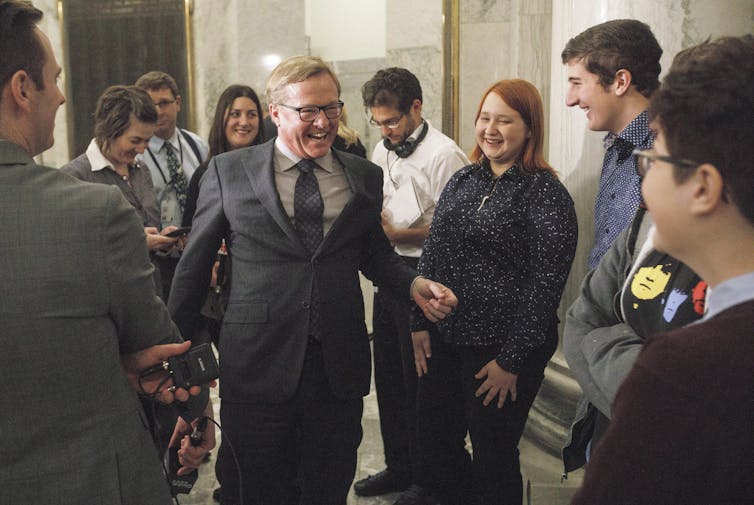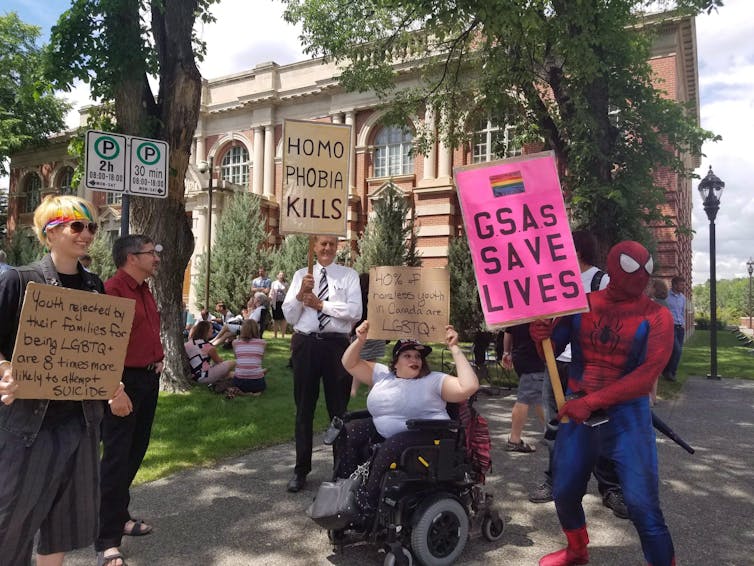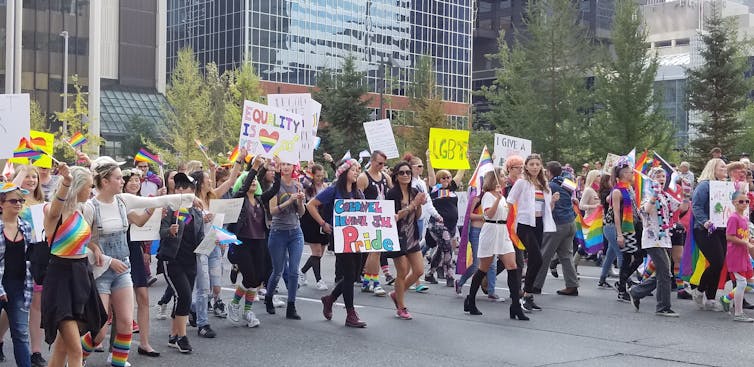
How Albertans vote next week will have major implications for vulnerable populations in the province, especially 2SLGBTQ+ youth.
The rise in anti-2SLGBTQ+ hate crimes, violent protests at youth drag events and a raging debate about book bans in schools are just a few of the issues directly impacting 2SLGBTQ+ youth and their parents and allies.
And yet, there has been too little attention paid to the campaign promises and historical records of Alberta’s major political parties on the issue of 2SLGBTQ+ rights.
Alberta has high gender diversity
In Canada, about one million people are 2SLGBTQ+. Almost one-third of this population is under the age of 25.
By this estimate, there may be approximately 175,000 2SLGBTQ+ residents of Alberta. The province has higher gender diversity in youth than Canada at large, with more than 12 per cent of Canada’s transgender and non-binary young people living in the province.
This means that in Alberta, if you don’t identify as 2SLGBTQ+ then you probably know someone who does, and they are likely a young person.
Where do Alberta’s New Democratic Party (NDP) and United Conservative Party (UCP) stand on 2SLGBTQ+ youth rights?

NDP
The NDP’s current platform commits its government to restoring the rights of youth to form and join gay-straight alliances (GSAs) with privacy protections, to expand coverage for trans health care and to develop an inclusive and affirming curriculum.
NDP Leader Rachel Notley cites the 2019 passage of the Conservative government’s Bill 8, which erased NDP-backed measures to protect GSAs in schools, as among the reasons she decided to stay on as leader to run in the 2023 election.
Read more: Why gay-straight alliance clubs could sway the Alberta election
Notley dubbed Bill 8 “Bill Hate” and speaks explicitly about her disgust with the UCP’s celebration of its passing that involved party members splashing in the reflecting pool on the legislative grounds.
When her government was in power, it introduced and passed Bill 7, which amended the Alberta Human Rights Act to prohibit discrimination on the basis of gender identity and gender expression.
In terms of visibility and representation, the NDP’s Janis Irwin (Alberta’s “ML Gay”) has a demonstrable record of advocacy on 2SLGBTQ+ rights. Her dedication to supporting 2SLGBTQ+ youth across the province is also exemplary. In 2022, when Calgary Pride introduced an approval process for political parties to march in the parade, the NDP passed the test.
UCP
The UCP’s current platform on 2SLGBTQ+ issues is unclear. Nestled under the culture and inclusivity umbrella, the UCP platform on 2SLGBTQ+ rights includes the fact that the party recognizes Pride Month by raising the Pride flag. While the UCP indicates it has appointed a staff member focused on 2SLGBTQ+ Albertans, it’s unclear who was appointed and what work they have done to date.
The UCP has a deeply troubling track record when it comes to 2SLGBTQ+ rights. Among the UCP’s first measures passed under Premier Danielle Smith’s leadership was Resolution 17. It shifts the rights of self-determination and bodily autonomy from young people to their parents, who can refuse to recognize their child’s gender identity if it is “incongruent with the child’s birth sex.”
This resolution upholds the rhetoric of “parental rights,” which has become a dog whistle for discrimination against 2SLGBTQ+ youth around the world.
As we previously argued about Resolution 17, the evidence makes clear that it is vital for the health and wellbeing of trans and non-binary youth to have their gender identity affirmed.

In terms of visibility and representation, UCP candidates have shown little regard for the rights of 2SLGBTQ+ youth.
It was recently revealed that UCP candidate Jennifer Johnson made transphobic remarks in 2022. She advocated for removing sex education from school curriculum and repeated misinformed and discredited rumours about gender-affirming health care.
She also equated trans children in schools to putting “poop” in cookie batter — in other words, a contamination. Smith’s original response was to distance herself from Johnson but she now suggests that the candidate, if elected, could find a place in the UCP caucus “with a lot of work.”
Another UCP candidate, Torry Tanner, resigned after a campaign video showed her claiming that kindergarten children were being shown “pornographic materials” and that teachers were helping kids change their gender identity without parental consent or knowledge.
Danielle Smith
Smith, leader of the UCP, has her own lengthy record of letting down 2SLGBTQ+ people. She refused to disavow Wildrose candidate Allan Hunsperger’s 2012 homophobic blog post when he stated that gay people “will suffer the rest of eternity in a lake of fire, hell, a place of eternal suffering.”
Instead, Smith argued that Hunsperger made these statements in his role as a pastor, not as a political candidate.
Smith’s dismaying record is consistent with her party’s actions. It was the UCP, after all, that cut funding for gender-affirming surgery in 2009.
In 2022, Calgary Pride refused to allow the UCP to participate, citing the party’s inability to meet the required threshold of support for the community.

What’s at stake
In a recent debate, Smith was pressed on how the UCP would protect LGBTQ+ rights. She responded that these issues were private family matters and should be depoliticized.
But human rights are always political. Indeed, there is a direct link between anti-2SLGBTQ+ rhetoric and increasing violence targeting 2SLGBTQ+ communities.
How Alberta votes on May 29 will either pave the way for 2SLGBTQ+ youth to be affirmed in their identities or it will create a formal pathway for homophobia, biphobia and transphobia in the province.
The authors do not work for, consult, own shares in or receive funding from any company or organisation that would benefit from this article, and have disclosed no relevant affiliations beyond their academic appointment.
This article was originally published on The Conversation. Read the original article.







